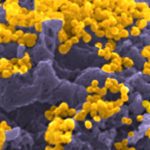Link to Pubmed [PMID] – 18790674
Clin. Immunol. 2008 Nov;129(2):304-12
Paraneoplastic pemphigus (PNP) is characterized by an autoantibody response directed against desmosomal antigens, desmogleins and plakin’s proteins, i.e., periplakin and envoplakin. Notably, PNP antibodies were shown to recognize major epitopes located in the linker subdomain of human envoplakin and thus, may constitute a diagnostic marker of PNP. In this study, a recombinant envoplakin-linker subdomain (rENV-L) was produced and used to develop a specific bead-based assay to determine the prevalence and titers of anti-rENV-L antibodies in patients with different types of autoimmune bullous skin diseases. Sera from 33 PNP, 41 pemphigus vulgaris, 46 pemphigus foliaceus, 24 bullous pemphigoid and 74 normal subjects were analyzed by rENV-L bead-based assay: 23/33 (69.7%) PNP, 2/24 (8.3%) bullous pemphigoid and 4/74 (5.4%) healthy control sera showed IgG reactivity against rENV-L. For PNP, the sensitivity and specificity of the assay were 69.7% and 94.6%, respectively. Among the PNP sera reacting with envoplakin and periplakin by immunoblot analysis, 80.8% contained anti-rENV-L antibodies. Finally, we showed that an anti-rENV-L mAb that recognizes both envoplakin and periplakin gave the same fluorescence pattern on rat bladder sections than PNP sera. Thus, anti-rENV-L antibodies constitute a useful diagnostic marker of PNP and our bead-based assay, notably combined with other epidermal autoantigens, a useful tool to diagnose PNP.

